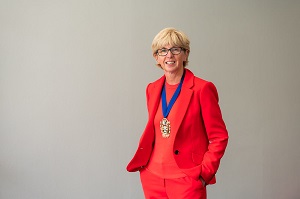A CIPFA Charity and Third Sector case study for Caroline Rassell, Chief Executive Officer, Parkinson’s UK
 As chief executive officer of Parkinson’s UK, Caroline Rassell leads Europe’s largest organisation representing people with Parkinson’s disease, with a 38,000-strong membership and a turnover of around £40m. The charity is dedicated to working for the Parkinson’s community, supporting and driving better care, treatments and quality of life for those living with the disease.
As chief executive officer of Parkinson’s UK, Caroline Rassell leads Europe’s largest organisation representing people with Parkinson’s disease, with a 38,000-strong membership and a turnover of around £40m. The charity is dedicated to working for the Parkinson’s community, supporting and driving better care, treatments and quality of life for those living with the disease.
Caroline took on the position at Parkinson’s UK in September 2021, bringing a wealth of experience gained through extensive senior leadership roles in a number of large organisations across a public and charity sector career spanning more than 30 years. These include chief executive, chief finance officer and senior executive leadership roles in major NHS commissioning bodies, local government and charities.
Caroline was president of CIPFA in 2023-24, having been a member of the Institute since 1989, when as a trainee accountant at the Corporation of London, she gained her CIPFA qualification.
What led you to become a CIPFA member and to qualify with CIPFA?
I actually wanted to become an accountant from the age of seven, which most people think is completely bizarre. I wanted to become a CIPFA accountant because my mum and dad both worked in local government and instilled in me a sense of duty and CIPFA was the natural choice.
It felt like a natural progression for me. I was brought up in an environment where the culture was around the importance of making sure that everybody has an opportunity to do well, and that the public sector and the services that it provides are fundamental to raising everybody's standards of living and hope. That ethos is part of my moral code.
I went to work for the Corporation of London straight from school as a trainee accountant and did the Association of Accounting Technicians (AAT) qualifications first, and then was allowed to progress to CIPFA. I was able to experience the things I was learning through the CIPFA programme while on the job, which was invaluable.
What have been the greatest challenges both during your career and within the public finance and charity sectors as a whole?
The biggest challenge is speaking truth to power, and being able to be transparent and honest about a financial position that, as a financial professional, you see and understand. Having been a chief executive, that was still the biggest challenge. Many people in power don't want to – and struggle with – hearing just how complex and difficult certain situations are, particularly financial situations. And I think that that's something that has been difficult throughout my career. I see finance professionals, particularly in the NHS, being compromised between their moral code of conduct and what they're being encouraged to stand behind – numbers and figures that may not tell the full truth.
If you don't start with that level of honesty and transparency, you don’t have a firm foundation to do anything. It’s something I feel passionate about, because we have trained people brilliantly – particularly through CIPFA – to be transparent and have a code of conduct and ethics. And then when you get into the workplace and the people you're working for don't appreciate that, that's really difficult.
What has been the most rewarding aspect of working in the public or charity sector?
Definitely the most rewarding part has been working with the people we represent, when you get an opportunity to connect with people and make a difference. When I was director of finance and specialist commissioning for NHS Southend Primary Care Trust, for example, we brought a cardiac procedure to the local hospital that cut waiting times as well as cut costs. We really made an impact – people could have a potentially life-saving procedure done locally rather than having to travel to London. That was fabulous.
When you make a difference, it's amazing. And in the charity sector, the greatest thing is being able to get out and connect with the people that you are serving. We are there to support our members, so to be able to listen, connect, and do something that changes someone's outlook and gives them hope – that's such a privilege.
What have been the highlights or biggest successes of your career to date? Any standout, pivotal moments?
Bringing the cardiac procedure to Southend mentioned above was absolutely brilliant. Also, when I was in my last role in the NHS, as chief executive and accountable officer at Mid Essex Clinical Commissioning Group, we started to try and create a movement called LiveWell, where we were encouraging a greater understanding about the importance of people taking control of their health and wellbeing, and what they can do to live well at any stage in your life. As an organisation, we took that onboard ourselves, and for two years running won Active Employer of the Year, because across the whole of the group, colleagues decided that they wanted to improve how they lived – whether it was walking, running, ballroom dancing or any other physical activity. It's great when you get colleagues that you work with actively standing behind something that you are trying to communicate to the public.
And in my current role, I've been working with a group of ex-BBC journalists who all have Parkinson's – possibly the best-known being Jeremy Paxman and Rory Cellan-Jones. Together, we've managed to get a petition to government, which we delivered on World Parkinson's Day [11 April] this year, to highlight the lack of investment in Parkinson's services. I'm hoping that we are starting to move the discussion and focus so that the community that I now represent gets better care.
What's the best piece of advice you've been given and by whom?
It’s all about the people. When I was in my first job at the Corporation of London, my group accountant Peter Smith insisted that we went out and visited every service that we were doing the accounts for. Because, he said, you can't understand just by looking at the numbers, you have to go out and see what those numbers are delivering. And that has stayed with me since. I would advise anyone studying for CIPFA or anyone who's already a CIPFA member to go out and meet either the people that you are making decisions about or the services you are the accountant for, because it then becomes real.
What advice would you give to people who are beginning their career in public finance?
Don't lose sight of the fact that you are here to make a difference to a community. While you might think that a role in finance is not making as powerful an impact as one on the frontline, it absolutely is. And it's a privilege to be in that position.
The other piece of advice is to value your voice and make sure you use it effectively. I'm really interested in how newly qualified accountants come with a whole different perspective on the future and what good looks like. We've got to start to amplify and listen to people who are new to the profession because they're going to brings fresh ideas into the profession.
What book, film or podcast would you recommend to anyone working in public finance?
I would recommend the series of biographies written by Alan Johnson, the former Labour Party MP and Secretary of State for Health from 2007-2009. He had the most impoverished upbringing in Notting Hill, he was orphaned at 13 and left school at 15. His life journey, which led him to become a government minister under Tony Blair and Gordon Brown, shows the importance of community and public service. It's a really human story, and it affirms why we need brilliant people in public service.



